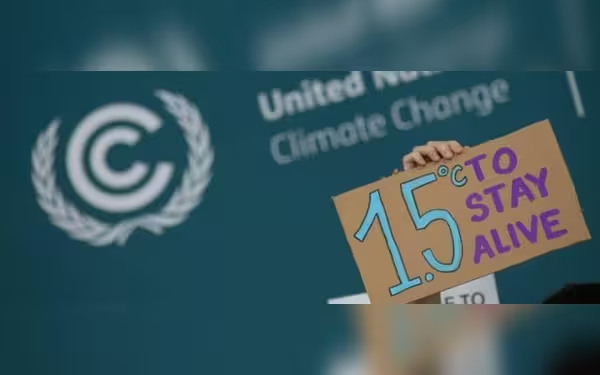Monday, December 23, 2024 02:18 PM
U.N. Climate Talks Propose $250 Billion Annual Fund by 2035
- Wealthy nations urged to commit $250 billion annually.
- Draft deal emphasizes urgent climate financing needs.
- Developing countries demand fair climate finance solutions.
 Image Credits: urdupoint
Image Credits: urdupointU.N. climate talks propose a $250 billion annual fund by 2035 to support developing nations in combating climate change.
The ongoing climate crisis has become a pressing issue for nations around the globe, particularly for those that are most vulnerable to its effects. As the world grapples with rising temperatures, extreme weather events, and environmental degradation, the need for substantial financial support has never been more critical. Recently, during the United Nations climate talks in Baku, a new draft deal was proposed that calls for wealthy nations to commit a staggering $250 billion annually by 2035. This funding aims to assist developing countries in adapting to climate change and transitioning to renewable energy sources.
The draft deal, presented on the final day of the two-week negotiations, emphasizes the urgency of addressing climate financing. It sets an ambitious overall goal of reaching at least $1.3 trillion by 2035. However, the specifics regarding how these funds will be raised—whether through grants, loans, or private sector contributions—remain unclear. This lack of detail has raised concerns among various delegations and climate advocates.
Many civil society representatives have expressed their disappointment with the draft. Namrata Chowdhary from the international environmental organization 350.org described the proposal as “disappointing” and a “slap” to those in developing nations. She highlighted the dire consequences of inaction, stating that wealthy countries are “gambling with the lives of people in the developing nations and small islands.” This sentiment was echoed by Lidy Nacpil from the Asian Peoples’ Movement on Debt and Development, who argued that climate finance should not come in the form of loans, as this only exacerbates the debt burden faced by these nations.
Jacobo Ocharan from Climate Action Network International urged developing countries to remain steadfast in their negotiations, emphasizing that “no deal is better than a bad deal.” This highlights the critical nature of the discussions taking place at COP29, which has been dubbed the ‘climate finance COP.’ The conference aims to establish a new global climate finance target to replace the existing $100 billion goal set to expire in 2025.
Experts have estimated that the new annual funding goal should be between $1 trillion and $1.3 trillion. This funding is essential for vulnerable nations to address the loss and damage caused by climate change and to develop their own clean energy systems. In a positive development, multilateral development banks recently announced a significant increase in climate finance for low- and middle-income countries, projecting to reach $120 billion annually by 2030, with an additional $65 billion expected from the private sector.
As the world continues to face the realities of climate change, the outcomes of these negotiations will be crucial. The commitment of wealthy nations to provide substantial financial support is not just a matter of charity; it is a moral obligation to ensure a sustainable future for all. The stakes are high, and the time for action is now. The decisions made in Baku will have lasting implications for the planet and its inhabitants, making it imperative for all parties to engage in meaningful dialogue and collaboration.













